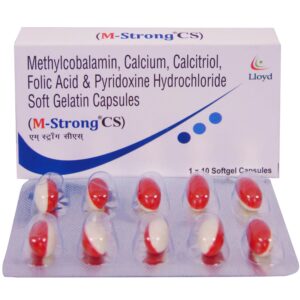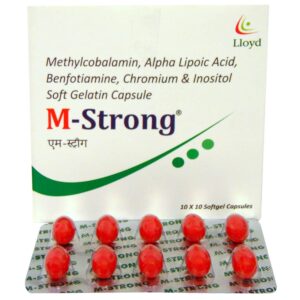VIT C + FOLIC ACID + VIT B12 + ZINC + FERROUS FUMARATE
Vit C: Drug: Vitamin C (Ascorbic Acid)
Description: Vitamin C, also known as ascorbic acid, is a water-soluble vitamin found in various fruits and vegetables. It plays a vital role in the growth, development, and repair of tissues in the body. Vitamin C is an essential nutrient and acts as a powerful antioxidant, helping to protect cells from damaging free radicals.
Use: Vitamin C is primarily used as a dietary supplement to prevent or treat vitamin C deficiency. It is also used for the prevention and treatment of scurvy, a condition caused by vitamin C deficiency. Additionally, vitamin C is believed to have immune-enhancing properties and is often used to support immune function. Some individuals also use vitamin C for cold prevention, wound healing, and as an adjunct therapy in certain cancers.
Mechanism of Action: Vitamin C has several important functions in the body. As an antioxidant, it helps to neutralize free radicals and protect against oxidative stress. This can help prevent cell damage and promote overall health. Vitamin C is involved in collagen synthesis, a protein necessary for the health of connective tissues, such as skin, blood vessels, bones, and tendons. It also aids in the absorption of iron and supports the immune system.
Dose: The recommended daily intake of vitamin C varies depending on age, gender, and specific health conditions. For most adults, the Recommended Dietary Allowance (RDA) for vitamin C is 75-90 mg per day. However, higher doses may be necessary in certain cases, such as during pregnancy, breastfeeding, or for individuals with specific medical conditions as advised by a healthcare professional.
Side Effects: Vitamin C is generally safe and well-tolerated when taken in recommended doses. However, high doses of vitamin C (greater than 2000 mg/day) can cause gastrointestinal disturbances such as diarrhea, nausea, and stomach cramps. Individuals with a history of kidney stones should exercise caution when taking high doses of vitamin C, as it can increase the risk of stone formation. Rarely, allergic reactions to vitamin C supplements may occur, characterized by symptoms like rash, itching, and difficulty breathing. It is always recommended to consult a healthcare professional before starting any new supplement, including vitamin C.
Folic Acid: Folic acid, also known as vitamin B9, is a water-soluble vitamin that plays a crucial role in various bodily functions, including the production of red blood cells, DNA synthesis, and cell division. It is essential for proper growth and development, especially during pregnancy.
Folic acid is commonly used to prevent and treat folate deficiency, a condition that can result in anemia and other health problems. It is also recommended for women who are planning to become pregnant or are pregnant, as it helps prevent certain birth defects of the baby’s brain and spine, known as neural tube defects.
The mechanism of action of folic acid involves its conversion into its biologically active form, methyltetrahydrofolate, in the body. Methyltetrahydrofolate serves as a coenzyme in various biochemical reactions, including the synthesis of DNA and RNA. By providing the necessary building blocks for DNA synthesis, folic acid supports cell growth and replication.
The recommended daily dose of folic acid varies depending on the individual’s age, sex, and particular health conditions. In adults, the typical dosage for the prevention of folate deficiency is 400 to 800 micrograms (mcg) per day. For pregnant women, the recommended dosage increases to 600 to 800 mcg per day. It is often available as an over-the-counter supplement or in combination with other vitamins.
While folic acid is generally considered safe, it may cause some side effects in certain individuals, particularly when taken in high doses. Common side effects include nausea, abdominal cramps, diarrhea, and a bitter taste in the mouth. Allergic reactions are rare but possible. Additionally, large doses of folic acid may mask symptoms of a vitamin B12 deficiency, leading to a delay in its diagnosis and treatment.
It is important to note that folic acid supplementation should be taken under medical supervision, especially in individuals with underlying health conditions or those who are taking certain medications. If you have any concerns or questions about folic acid use, consult with a healthcare professional.
Vit B12: Drug: Vitamin B12
Use: Vitamin B12, also known as cobalamin, is a water-soluble vitamin that plays a crucial role in the production of red blood cells and the maintenance of nerves and DNA synthesis. It is primarily used to treat or prevent vitamin B12 deficiency, which can occur due to conditions such as pernicious anemia, gastrointestinal disorders, or a vegan or vegetarian diet that lacks animal products.
Mechanism of Action: Vitamin B12 is essential for the proper functioning of the body’s cells. It is involved in the metabolism of proteins, fats, and carbohydrates, and helps in the formation of hemoglobin, the protein responsible for carrying oxygen in the blood. Vitamin B12 is also necessary for the synthesis of myelin, a substance that surrounds and protects nerves.
Dose: The appropriate dosage of vitamin B12 varies depending on the individual’s age, medical condition, and the severity of deficiency. It can be taken orally as tablets or capsules, as an intramuscular injection, or as a nasal spray. The recommended dietary allowance (RDA) for vitamin B12 ranges from 2.4 micrograms (mcg) for adults to higher quantities for pregnant and breastfeeding women. Higher doses may be needed for therapeutic purposes, and it is best to consult a healthcare professional for personalized dosing recommendations.
Side Effects: Vitamin B12 is generally considered safe, even in high doses, as it is a water-soluble vitamin that can be efficiently excreted by the body. However, some individuals may experience allergic reactions, such as itching, rash, or swelling, after taking vitamin B12 supplements. In rare cases, high doses of vitamin B12 may cause diarrhea, itching, blood clotting abnormalities, or nervous system disorders. It is important to follow the recommended dosage and consult a healthcare professional if any adverse effects occur.
Zinc: Zinc is an essential mineral that is commonly used as a dietary supplement. It plays a crucial role in various physiological processes in the body, including immune function, protein synthesis, and wound healing. Zinc supplements are also used to treat zinc deficiency and certain skin conditions, such as acne.
The mechanism of action of zinc is not fully understood. However, it is known to be involved in regulating the activity of numerous enzymes and transcription factors. It also has antioxidant properties, which may help protect cells against oxidative stress and reduce inflammation.
The recommended daily dose of zinc varies depending on age, sex, and specific health conditions. For adults, the recommended dietary allowance (RDA) is 11 mg for males and 8 mg for females. However, higher doses may be required for individuals with specific health conditions or deficiencies. It’s important to consult with a healthcare professional to determine the appropriate dose for your specific needs.
While zinc is generally safe when taken within the recommended doses, it can cause certain side effects, especially when taken in excessive amounts. Common side effects include nausea, vomiting, diarrhea, stomach cramps, and headaches. Prolonged or high-dose zinc supplementation can lead to copper deficiency, impaired immune function, lowered HDL cholesterol levels, and decreased absorption of other essential minerals.
It is important to note that zinc supplements may interact with certain medications, such as antibiotics, diuretics, and penicillamine. Additionally, zinc may interfere with the absorption of certain medications when taken at the same time. Therefore, it is crucial to inform your healthcare provider about any medications you are taking before starting zinc supplementation.
Overall, zinc is an important mineral that plays a crucial role in various bodily functions. However, it should be used with caution, and it’s always advisable to consult with a healthcare professional before starting any new dietary supplement.
Ferrous Fumarate: Ferrous Fumarate is an oral iron supplement commonly used to treat iron deficiency anemia. It is available as tablets or capsules and is usually taken by mouth.
The mechanism of action of Ferrous Fumarate is related to its iron content. Iron is an essential mineral required for the production of hemoglobin, a protein in red blood cells that transports oxygen throughout the body. When a person has iron deficiency anemia, their body lacks sufficient iron to produce enough healthy red blood cells, leading to symptoms such as fatigue, weakness, and shortness of breath. Ferrous Fumarate provides a source of supplemental iron, helping to replenish the body’s iron stores and promote the production of healthy red blood cells.
The dosage of Ferrous Fumarate depends on the severity of iron deficiency and the individual’s response to treatment. Generally, the recommended dose for adults is 100-200 mg (elemental iron) per day, divided into 2-3 doses. It is important to follow the instructions provided by the healthcare professional or the information on the packaging.
Common side effects of Ferrous Fumarate include stomach upset, constipation, and dark-colored stools. Taking the medication with food can help alleviate stomach-related side effects. In some cases, it may also cause nausea or diarrhea. If these side effects persist or worsen, it is advisable to consult a doctor.
It is important to note that Ferrous Fumarate should not be used without a doctor’s prescription or recommendation. Iron supplements should not be taken in excessive amounts, as it can lead to iron toxicity, which can cause serious health complications. Regular blood tests may be necessary to monitor iron levels during treatment. Additionally, Ferrous Fumarate can interact with certain medications, so it is crucial to inform the healthcare provider about all other medications or supplements being taken.


